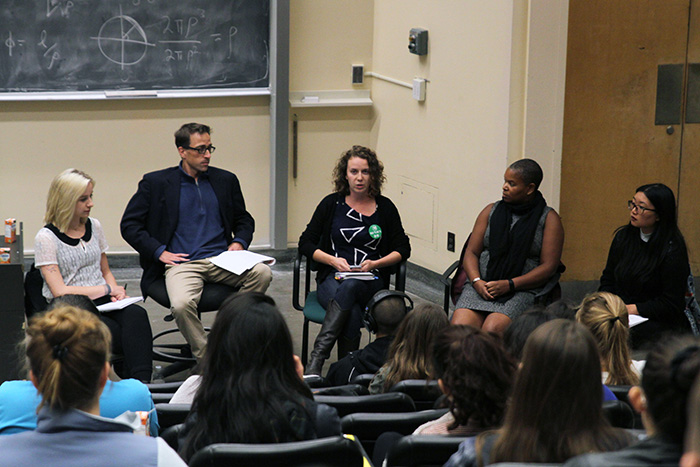The #ConsentMcGill campaign kicked off its third year with a week of speaking panels, workshops, and other activities designed to educate members of the McGill community about consent, sexual violence, and how to build healthy relationships. Events were scheduled from Sept. 26 to 30 and covered a variety of topics related to consent on the university campus. Included in the week’s programming was a workshop on how to intervene in cases of sexual assault and a symposium that covered the topic of caring for survivors of sexual violence. Other events included a pottery class that promoted therapeutic self-care and a speaking panel on the power dynamics that contribute to sexual violence at the university.
Coordinated by the Office of the Dean of Students, #ConsentMcGill has been hosting the annual week-long campaign since 2014. The initiative works with students, staff, and faculty, and seeks to promote the three key principles of consent: Ask, listen, and respect. Organized largely by Liaison Officer (Harm Reduction), Bianca Tétrault, #ConsentMcGill is run by volunteers year round.
Consent McGill Panel
The Consent McGill Panel consisted of four speakers, each with different experiences with sexual violence and power dynamics. The speakers included Adrienne Piggott, one of McGill’s harassment assessors; Jason Opal, an assistant professor from the Department of History; Nina Hermes, a floor fellow at RVC and sexual violence survivor; and Claire Michela, the president of the Association of McGill University Support Employees (AMUSE).
The panel’s topics ranged from the responsibility of faculty to create a safe space for students to the efficacy of the university’s sexual harassment policy, as well as the role of witnesses of sexual violence.
“From a professor standpoint, it should be said particularly of professors that whether they like it or not […] they are in a position of privilege,” Opal said. “That privilege therefore means that you have to generate healthy boundaries, and guard healthy boundaries and be there as a form of respect and service to your students.”
Students were invited to ask the panel questions and participate in discussions. Aside from the speakers’ prepared introductions, the conversation was spontaneous with new questions being posed by both the host, the Equity and Diversity Commissioner of PGSS, Angela Yu, and audience members. Students participated in discussions about the role of McGill’s drinking culture, the role of parents in teaching their children about healthy relationships, and the effectiveness of McGill’s policies.
One of the central topics of the night was about the ability of McGill to pursue allegations of sexual harassment. Piggott is directly involved with the investigation of harassment complaints and with redrafting the university’s sexual harassment and discrimination policy.
“[The harassment policy] was written by people, so we adjust as we go,” Piggott said. “We don’t necessarily get it right the first time we draft.”
In response to one of the final questions of the night, however, Michela pointed out that this is not a hopeless message.
“Work together,” Michela said. “Speak up. It took that straw that broke the camel’s back for people to finally get together and be like ‘alright, we’re going to work on [the policy….]’ Make enough noise and you can maybe get that.”
How to Respond to and Support Disclosures Workshops
On Sept. 28 and 29, two workshops, titled “How to Respond to and Support Disclosures,” were hosted by Tétrault.
Tétrault, who has been running this campaign for three years, said it is essential to hold workshops like these because it is important to be prepared to support a survivor of sexual violence.
“Students look to certain members of the community,” Tétrault said. “It’s important to be prepared to support a student.”
In Tétrault’s presentation, she emphasized the importance of supporting survivors, whether as an active listener or as a source to help them to find the right resources. Tétrault also highlighted information on rape kits and important legal details, such as McGill’s current process for dealing with sexual violence.
Susanne Baumann-Moroy, human resources advisor in the Department of Engineering, said that the information shared in the “How to Respond to and Support Disclosures” presentation should be more widely known among the McGill community.
“Information for people who are sexually assaulted, like [the fact that you] only [have] 72 hours to get a [rape kit], is very important and should be common knowledge,” Baumann-Moroy said.
During the workshops, Tétrault noted that she was disappointed with the gender disparity of the attendees. Around 15 people attended the Sept. 29 workshop, but only two were male.
“It really speaks to who the advocates [for] those who are assaulted are [at McGill],” Tétrault said.
Baumann-Moroy believes that presentations like “How to Respond to and Support Disclosures” should be mandatory for the McGill community.
“What we learned today was not only about sexual assault, but also about respecting each other,” Baumann-Moroy said.









